THE ACCOUNT: ETHICS AND VALUES OF CIVIL SERVANTS : Civil Service Ethics for UPSC Exams
THE ACCOUNT: ETHICS AND VALUES OF CIVIL SERVANTS : Civil Service Ethics for UPSC Exams
THE ACCOUNT: ETHICS AND VALUES OF CIVIL SERVANTS
Background of the account
Since the mid-1980s, the focal point of the development of administration in Finland has been the rationalisation of operations and the development of result-orientation. The system reforms have brought clear signs of ethics and values assuming a more and more important role. In the survey of the status of State personnel management (MoF 24/1997), 85% of the agency executives considered values and ethical questions important from the point-of-view of the operations of the agency. However, civil service ethics is so extensive and complex a phenomenon that the above result only gives a rough indication of its contents and significance.
Because no comprehensive up-to-date material on civil service ethics was available, the task of the Ethics Working Group was to ascertain the present situation. It would have been possible to compile the data in several ways, e.g. by interviewing experts or by requesting statements. Because the topic is rather extensive and because civil service ethics is emphasised in different ways depending on the task area, the best way of acquiring comprehensive data was a questionnaire. This report presents the results of the questionnaire on i.a. the following points.
1) changes in the values of governance
2) principles of civil service ethics
3) unethical practices and
4) factors affecting civil service ethics.
The method of implementing the questionnaire
The questionnaire was sent to c. 170 agencies and institutions of central State administration. The questionnaire was addressed to the head of the agency, who was asked to allocate the questionnaire to the top management of the agency and to personnel representatives. The distribution and copying of the form was carried out inside each agency. The form included a field for the number of persons to whom the questionnaire was distributed. The data was complemented by re-sending the form to agencies that had returned less than half of the answers by the due date (43 agencies). Even after this, 14 agencies did not answer the questionnaire at all. A total of 647 answers were received and the computed return percentage of the questionnaire was 70.2 (for further details cf. Appendix 1).
6.1 The value basis of civil service ethics
The questionnaire supports the assumption that the value basis of civil service ethics has changed in the last decade. It is interesting to note that the value basis was deemed to have remained the same by only a fraction of those who answered the questionnaire, only 3.0 %. The change was estimated to be slightly stronger in one’s own agency than within administration on average (cf. Table 2). Is this due to an actual change in values or only to a feeling of change as a by-product of other changes in working life?
Table 2: Changes in the values of State administration in the last 10 years (%)
Administration in general 38.5 58.5 3.0
One's own agency 45.2 49.7 5.1
Some light is shed on the question when the values are studied in more detail in Figure 1. Over half of those who answered felt that the most important values of State administration are legality (65.5%), service (61.5%), expertise (58.1%), impartiality (57.5%) and justice (56.6%). In addition to these values, also openness (47.8%) result-orientation (42.3%) and integrity, i.e. incorruptibility, (33.7%) were emphasised. The opinions of the management and the personnel representatives were very similar: the five most important values were common, only their order was slightly different.
Figure 1: The most important values in State administration (%)
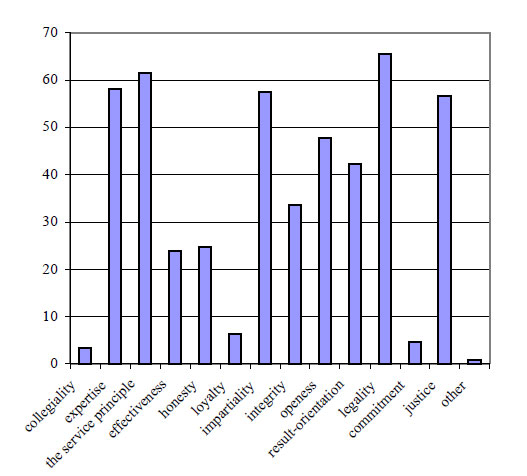
Legality, impartiality and expertise are traditional virtues of State administration while the service principle and result-orientation are more modern values. Although those who answered feel that the value basis has changed, this does not mean that the old values have been wiped away. Next to the traditional values, new values have appeared, of which the service principle has already made a breakthrough and result-orientation will follow. One could talk about a conglomeration of values, to which each era adds its own layer.
The new values are accepted more easily if they do not contradict the earlier values. Changes can easily lead to different combat situations, in which the supporters of different values defend their positions by means of exaggerations: for example, the very idea of improving the effectiveness of operations is deemed to lead to a weakening of the ability to serve and of legal protection. However, these are not logically or causally bound to each other, but can be implemented side by side. The central values of State administration do not as such contradict each other, but they can easily lead to a conflict concerning the value that should be emphasised in each situation. Indeed, conflicts between values are the basic reasons for ethical problems. All the above-mentioned values are important, but they cannot all be always complied with at the same time.
The values of one’s own agency
In the opinion of those who answered the questionnaire, the values of their own agency do not greatly differ from the general values of State administration. The only clearly distinctive feature was the fact that, instead of legality, expertise (82.1%) became the most important value. The aim has been to introduce the values of agencies i.a. in operating strategies, personnel strategies, in connection with operational and financial plans, in planning documents, separate declarations of operational values, service commitments, the quality manual and the mission statement. In addition to stating the values, actual principles and norms can be found in the professional-ethical manuals and ethical rules of certain special sectors. According to the answers received, over half (62%) of the agencies in some way call attention to values and civil service ethics in their strategy documents and some of the agencies (10%) are launching development work relating to the subject. One fifth (19%) of the agencies pays no attention to values and civil service ethics in their strategy documents.
In the light of the documents, the values of different agencies are very different. One agency emphasises expertise, job satisfaction and awareness of quality and cost efficiency, while another agency emphasises result-orientation, international relations and initiative. Such traditional values of civil service ethics as impartiality, independence and compliance with the law are not very often mentioned in the documents. As factors uniting the agencies one could mention customer-orientation, result-orientation and openness, which are presented as the most important values in nearly every other document. Every third document brought forth the importance of continuous development or the readiness for change, cooperation and expertise. Other values mentioned included quality consciousness, reliability, environmental protection and mutual respect.
The differences between the values of the agencies may seem disturbingly big at first and raise the question of the disintegration of civil service ethics, but in practical work the aim is not to set unconditional values. It is more a question of strategic values, which are taken more into account in certain projects within a certain time frame, than of defining permanent ultimate values.
It is clearly the aim of the agencies to bring forward values which are central from the point-of-view of their task areas, which helps to clarify its operations. When the personnel knows what is expected, there is less confusion and the prerequisites for building confidence are good. Secondly, it is apparent that the values which have been brought forward in the different sectors are quite heterogeneous. There are big differences even between similar units, which raises the question as to whether the values which have been brought forward are the central ones after all. It would be good to sound the values of one’s own agency in relation to others, especially values providing the basis of the civil service ethics of State administration. If the process results in values which are unessential from the point-of-view of the operations, it only serves to obscure the requirements of public duties. Management by values needs to be more systematic and values need to be linked more closely to everyday work.
Evaluation of the values of the private sector
Those who answered the questionnaire were also asked to evaluate the values of the private sector at a general level. The comparison is important from the point-of-view of civil service ethics: if the values of State administration and the private sector are similar, there is no room for civil service ethics, it is more a question of general working life ethics. In the opinion of civil servants, the two central values of the private sector are result-orientation (75.7%) and effectiveness (73.3%). In the case of expertise and service, the situation did not really differ from State administration while openness (18.4%) and justice (19,0%) were not considered core values of the private sector by those who answered. The same question was asked in a different form further on in the questionnaire (cf. Figure 2).
Figure 2: The values of the civil servant body and the private sector (%)
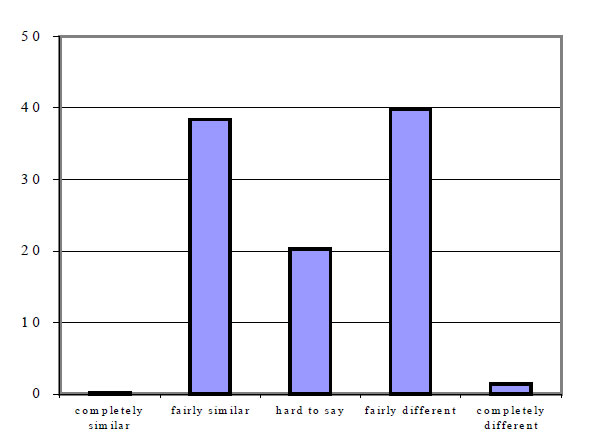
According to Figure 2, the opinions of civil servants on the value bases of the public and private sectors are divided into two: some see them as rather similar (38.4%) while to others they are quite different (39.8%). It should be noted that only one person (0.2%) felt that the values of the public and the private sectors were completely similar. On the basis of this material, one can conclude that civil servants see important similarities between the value bases of the public and private sectors. However, the value bases cannot be totally united, because, in addition to differences of emphasis, particularly openness and justice result in qualitative differences. These differences make civil service ethics rather unique.
The majority of those who answered felt that the values of State administration and practical operations correlated fairly well (78.3%). In other words, it seems that double standards do not occur very often ("don’t do as I do, do as I say"). Those who answered feel that value discussions are necessary (91.2%). According to the data, values are discussed more often among the management (78.3%) than among the whole personnel (48.5%). The most usual fora for value discussions were executive groups, cooperation bodies, various value seminars and personnel magazines. On the other hand, values are always present in discussions, if only implicitly, and the recognition of a discussion explicitly as a value discussion requires certain conceptual readiness. This is why the probability of recognising values or ethical sensitivity increases with the level of education (correspondingly also the number of 'hard to say' answers decreases). In this study the distortion caused by differences in education is slight, however, because as many as 91% of those who answered had academic degrees.
6.2 The clarity of the principles of civil service ethics
The civil servant management and personnel representatives were asked, in addition to values, also about the clarity of ethical principles. Principles mean rules, rights and obligations based on values. The majority of those who answered felt that the principles of civil service ethics are sufficiently clear (61.0%), but a significant number of those who answered felt that they are fairly unclear (19.7%). None of those who answered felt that the rules were fully unclear.
Figure 3: The clarity of the principles of civil service ethics (%)
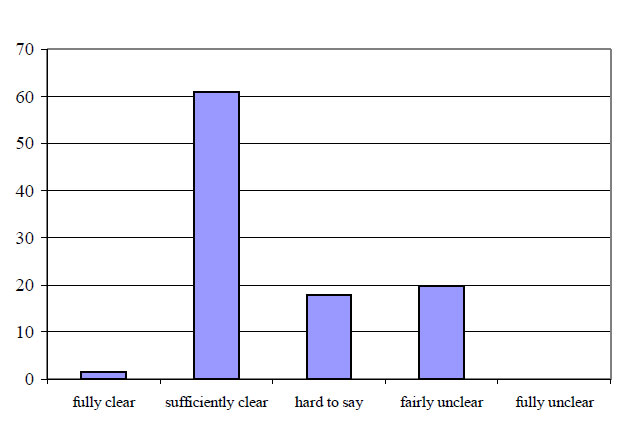
By combining the above-mentioned classes, the proportion of those who felt that the principles are clear is 62.4% and the proportion of those who felt that the principles are fairly unclear or for whom it is hard to say is 37.6%. This is most likely due to the fact that the central principles of civil service ethics cannot in fact be defined clearly unambiguously; they differ according to official status and administrative sector. For example, the personnel of the judicial system is expected to show great moderation regarding entertaining or hospitality, while in many management tasks entertainment is a necessary part of official duties. In some countries the situation has been clarified by drawing up ethical codes, which list either the core values of administration (Great Britain) or the central principles (the United States).
Two-thirds (67.5%) of those who answered estimated that ethical codes could be useful also in Finland. Among those who felt that civil service ethics are unclear, rules were even more in demand: 75.4% felt that rules are necessary.
One way to ensure the level of civil service ethics is the duty to declare one's interests. The duty of the highest civil servants to declare their financial and other interests is a means which is often used internationally to prevent disqualification and other situations endangering confidence. According to Table 2, those who answered the questionnaire felt that the duty to declare is justified (87.3%). On the other hand, the extension of the system to other highest managers is not deemed necessary (31.0%).
Table 3: The necessity of the duty to declare one's interests (%)
Present situation 87.3 7.8 4.8
Extension 31.0 55.3 13.7
Another means to prevent and monitor conflicts of interest is the duty to apply for permission for and to declare ancillary jobs. 44.4% of the heads of agencies have had to refuse ancillary jobs themselves or they have had to forbid a subordinate from accepting one. Among other top management, the corresponding figure is 34.6% and among the personnel representatives, 18.5%. The number of ancillary jobs of those who answered was not asked10. Apparently there is some administrative-sector-specific variation in the practice of notifying ancillary jobs and ancillary jobs are not supervised very actively.
Figure 4: The most harmful unethical administrative practices (%)
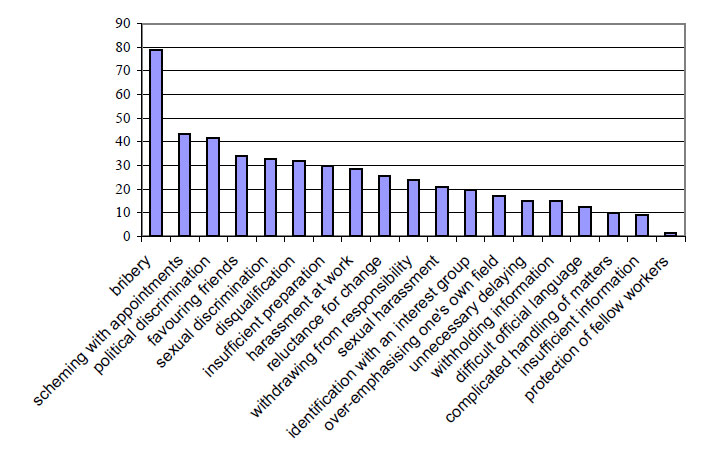
In Figure 4, a group of unethical administrative practices has been placed in the order of their "harmfulness". The Figure shows which phenomena the civil servants consider the most harmful ones, not the extent to which these phenomena occur. The civil servants feel that it is very important to keep public administration free from bribery (78.9%). Corruption as such is not a significant problem in Finland. According to the estimate of those who answered, corruption is the least frequent of all unethical administrative practices: 65.2% had never observed it, and according to 30.8% it occurs mainly at an annual level (the figures should not be interpreted so that the civil servant would have requested or accepted a bribe). However, when asked about gift-like benefits, it was noted that 61.5% of those who answered, or of the civil servants in their agency, had been offered a gift at some point, 48.7% had received an offer of a trip from a third party at some point and 82% had been offered a luncheon at some point. Whether these should be seen as corruptive phenomena largely depends on the details of the incident: was the offer made because of the official position of the person, was it intended to affect the actions of the civil servant, etc. According to those who answered, there has been no significant change in the offering of gift-like benefits in the last decade. Compared to the other European Union Member States, the situation relating to corruption in Finland was seen as extremely good (88.0%).
After bribery, the worst unethical administrative procedures were scheming with job packages and trading offices (43.2%) as well as political discrimination (41.8%). Also favouring friends (34.1%), sexual discrimination (32.5%) and participation in the handling of a matter despite one’s disqualification (31.9%) were considered extremely harmful practices. In the opinion of those who answered, the most usual of the above-mentioned unethical practices included the use of too difficult official language and reluctance for change. Also territorial thinking, unnecessarily complicated handling of matters, insufficient preparation, insufficient information and unnecessary delays occurred in administration. An exact study of these phenomena would, however, require a more detailed form or the use of an alternative method to compile data (e.g. interviews).
6.3 Factors affecting civil service ethics
The value basis and ethical principles of State administration are often learned only in working life, in practical situations involving interaction. Civil service ethics is not taught separately, and the teaching of the professional ethics of different sectors is quite unsystematic (Myyry 1999). Personnel administration can promote high level civil service ethics. With the reform of the grounds for appointments of the management, ethics and morals have been added to the general appointments criteria of the highest civil servants. This raises the question as to how civil service ethics are taken into account in recruitment, job familiarisation and personnel management.
The picture given by Table 4 on the way factors of civil service ethics are taken into account when appointing new personnel, is contradictory. According to the answers of the top management, ethical factors are taken into account significantly more often than according to the personnel representatives. The answers of both parties may either have been embroidered (giving "the correct answer") and exaggerated or the management may be better acquainted with the appointment of managers and the personnel representative with the appointment of other personnel. In other words, this may be a natural difference in points of view related to official status. In any case, the number of 'hard to say' answers was high in all the groups, which means that those who answered either do not have a comprehensive understanding of the grounds of recruitment in their agency or civil service ethics are not yet perceived as appointment criteria11. Both reasons may be true. Ethical points of view were taken up particularly in job interviews, where questions were asked on the values and interests of the applicant and his knowledge of the rules of the game of public administration.
Table 4: Consideration of factors of civil service ethics when appointing new personnel (%)
Head
48.5
12.4
39.1
Other top management
41.3
17.7
41.0
Personnel
23.7
26.0
50.3
Factors relating to civil service ethics can be taken up in connection with job familiarisation (cf. Table 4). According to the material, the situation varies considerably, i.e., it depends on the person handling the familiarisation. As was the case in the previous question, also here the points of view of the management and the personnel differ (22.2% vs. 11.2%).
Table 5: Consideration of factors of civil service ethics in job familiarisation (%)
Head
22.2
69.6
8.2
Other top management
19.2
68.5
12.2
Personnel
11.2
67.6
21.2
Also the relationship between personal and personnel management and ethics is considered more positive by the management than by personnel representatives (Table 5). Personal and personnel management have been the subject of special interest in State central administration only for the last few years. Therefore personnel management skills have not been very well developed or in demand, let alone valued. In the opinion of those who answered, ethical factors were considered above all in different value discussions and seminars (particularly in the executive group) and in training. In personal management, many issues can be promoted by one’s own example. In some agencies personnel management also included emphasising the ethical rules of the agency.
Table 6: Consideration of civil service ethics in personnel management
Head
50.9
14.6
34.5
Other top management
44.2
24.2
31.6
Personnel
22.2
33.9
43.9
As stated above, civil service ethics is a rather complex issue and it cannot be significantly affected by any individual measure. The ethics infrastructure offers a framework for analysing factors effecting civil service ethics. The evaluations of those who answered are found in Figure 5.
Figure 5: The effect of various measures on civil service ethics
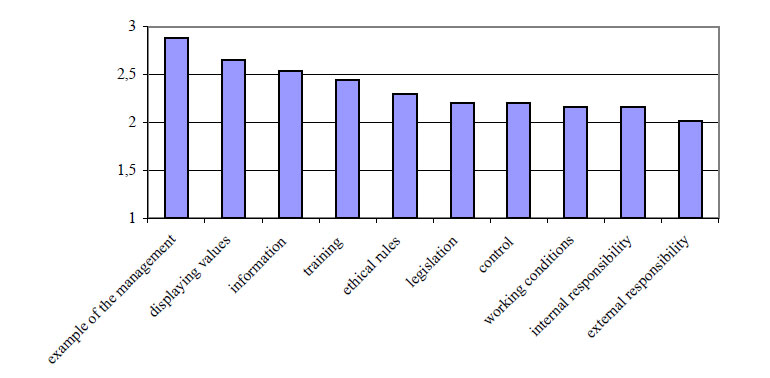
(1 practically no effect, 2 slight effect, 3 strong effect)
Those who answered felt that definitely the most important individual measure having an effect was the example of the management (2.9). With its own conduct, the management provides the standards which in time will penetrate the entire organisation. Another factor which was found to have a strong effect was displaying values (2.7). Factors with a slight effect were information (2.5), training (2.4) and ethical rules (2.3). The effect of legislation and other measures was found to be slighter. Legislation can and should be used to determine the minimum level of ethics in order to prevent abuse (low road), but it is difficult to use legislation to motivate and encourage people to ethically high-level conduct (high road). Internal (2.2, e.g. an audit) or external (2.0, e.g. inspections by the Parliamentary Ombudsman) mechanisms of responsibility were not deemed very significant. Also the significance of working conditions was deemed to be of little importance (2.2
The results of the questionnaire have been studied above mainly as a whole. This
is possible because there are no significant systematic differences between the
groups answering (these cases have each been reported separately). The
management of the agency and the personnel representatives agree on practically
all central issues. Nor are there any significant differences due to sex except
for the fact that women have chosen the alternative 'hard to say' more often.
It is clear that there is no unambiguous answer to many of the questions asked
in the questionnaire. The questions mainly serve to find out the impression of
the person of reality. The results of the questionnaire are not as such
normative in nature, because in ethics percentages are not valid as reasons. In
other words, if the majority of those who answered have the same opinion, it is
not yet any reason to act in the same way. One questionnaire does not disclose
the ultimate truth of a complex phenomenon such as civil service ethics. It is
more likely that the results may raise the right questions and provide
incentives for a discussion on the subject.
Online Crash Course for UPSC PRE Exam
Printed Study Material for UPSC Pre General Studies (Paper-1)
Go Back to Main Page
Courtesy: UPSC
